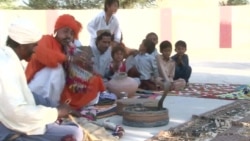They give their infants a drop of cobra poison when they are five or six months old—a form of initiation into life as a snake charmer.
That poison, according to Misri Jogi, a famous chieftain of a tribe of snake charmers in Pakistan’s Sindh province, creates a bond, enabling them to smell and catch snakes when they grow up. His last name comes from what his tribesmen are called in the local language — jogis.
“When I sit here and play the flute, I can smell if there is a snake in the vicinity,” Jogi said as he played the instrument while children from his tribe gathered around.
His eldest son, dressed in a bright orange tunic like his father, danced like a snake on the floor in front of him, slithering and swirling with the music.
A teacher and a leader of his community, Jogi has received multiple awards in Pakistan and other countries for his performances. He proudly displays pictures of his foreign travels to those who visit his home in Umerkot city.
For children in South Asia, in countries like India, Pakistan, and Bangladesh, jogis are a common site. They are street performers, wandering the cities and towns, playing their flutes, trying to attract local children to see a performance with their snakes and pay them for it.
Passed on for generations
The art is passed from generation to generation, from father to son. Women of the tribe usually do not handle snakes, although they are used to being around them.
While jogis catch snakes, they cannot keep them forever.
Instead, they say, they make a sacred pact with a snake in the name of Pir Goga, their guru of ancient times. They tell the snake they will release it after a given time, usually 3-4 months, if it agrees to cooperate and not hurt them.
Only a cobra is kept for a full year. It holds a kingly status among the snakes and jogis treat it as sacred. Their Pir Goga loved cobras and used to hang one around the neck.
“In our tribe, we don’t love our wives as much as we love our cobra. He is our friend, our companion during our travels,” Jogi explained.
They feed it milk and let it sleep in their beds to stay warm in winter. In return, they say, a cobra guards them against evil, human or otherwise.
“If a burglar or a thief comes in the night, or someone who tries to harm us, a cobra will wake up its charmer,” according to Jogi.
Talisman
A black cobra produces a talisman—a black, shiny, flat bead called a manka in the local language—that they say saves them from snakebites. Once placed on a bite, it sucks the poison from the blood, swelling in the process. The poison can then be squeezed out of the manka.
It is considered so valuable and sacred that a jogi would never sell one, no matter the price. Anyone who does, it is believed, faces bad luck.
It is, however, allowed, to give it as a gift. Daughters, when they are married, expect their fathers to give a manka in their dowry.
Misri Jogi’s historically wandering clan settled in Jogi Daro, in Umerkot, in the 1970s when the government offered them rights to that land. Staying in one place brought its own challenges to the jogi lifestyle.
Dwindling interest
As opportunities for formal schooling opened up, jogi children started moving towards more stable jobs and away from the nomadic existence.
“Those of our kids that are going to school are more interested in continuing with their studies,” Jogi acknowledges. Several of his own children fall into that category.
He hopes, however, that at least his oldest son will carry on his traditions and his name.





